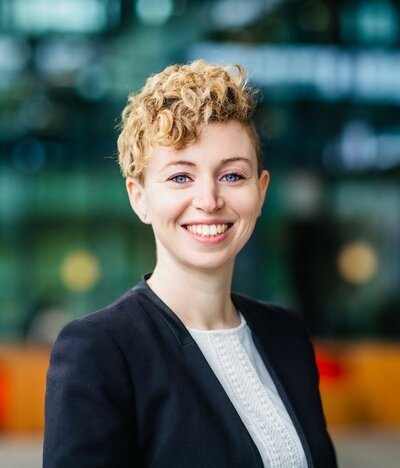Francesca Grisoni
Department / Institute
Group

RESEARCH PROFILE
Francesca Grisoni is an Assistant Professor in the Department of Biomedical Engineering, where she leads the Molecular Machine Learning team. Her research focuses on developing novel artificial intelligence (AI) methods for drug discovery, at the interface between computation and experimental validation in the wet-lab. Her team works at the intersection of (and melds concepts from) chemistry, biology, and computer science, to design innovative AI approaches tailored to molecule discovery. Her final goal is to augment human intelligence with artificial intelligence, to ultimately reach ‘better decisions faster’ in the discovery of therapeutic drugs.
My mission is to stretch the limits of AI in drug discovery, in order to create cutting-edge technology able to augment human creativity in the discovery of next-generation therapeutics.
ACADEMIC BACKGROUND
Francesca Grisoni studied Environmental Sciences at the University of Milano-Bicocca. There she also obtained her Ph.D. in 2016, working under the supervision of Prof. R. Todeschini, with a dissertation on interpretable machine learning for molecular property prediction. During her doctoral studies, she was hosted at ETH Zurich (Dept. Chemistry and Applied Biosciences) and at the U.S. EPA (National Center of Computational Toxicology). After working as a biostatistical consultant for Bracco Pharmaceuticals, and as a data scientist in a startup company for a year, Dr. Grisoni returned to academia. From 2017 to 2019, she was a joint postdoctoral fellow at the University of Milano-Bicocca and ETH Zurich, where she developed novel molecular descriptors tailored to scaffold hopping. In 2019 she joined the group of Prof. Gisbert Schneider at ETH Zurich as a senior postdoctoral researcher, where she focused on generative deep learning for drug discovery. In 2021, she was appointed Assistant Professor at the TU/e, where she currently leads the Molecular Machine Learning team. Dr. Grisoni has received several grants and awards, such as the Lush Young Researcher Prize, the Early Career Award 2022 from the Dutch Royal Netherlands Academy of Arts and Sciences (KNAW), and an ERC Starting Grant (2022).
Recent Publications
-
Davide Boldini,Davide Ballabio,Viviana Consonni,Roberto Todeschini,Francesca Grisoni,Stephan A. Sieber
Effectiveness of molecular fingerprints for exploring the chemical space of natural products
Journal of Cheminformatics (2024) -
Maria L. Faquetti,Laura Slappendel,Hélène Bigonne,Francesca Grisoni,Petra Schneider,Georg Aichinger,Gisbert Schneider,Shana J. Sturla,Andrea M. Burden
Baricitinib and tofacitinib off-target profile, with a focus on Alzheimer's disease
Alzheimer's and Dementia: Translational Research & Clinical Interventions (2024) -
Andrea Volkamer,Sereina Riniker,Eva Nittinger,Jessica Lanini,Francesca Grisoni,Emma Evertsson,Raquel Rodríguez-Pérez,Nadine Schneider
Machine learning for small molecule drug discovery in academia and industry
Artificial Intelligence in the Life Sciences (2023) -
Michael W. Mullowney,Katherine R. Duncan,Somayah S. Elsayed,Neha Garg,Justin J.J. van der Hooft,Nathaniel I. Martin,David Meijer,Barbara R. Terlouw,Friederike Biermann,Kai Blin
Artificial intelligence for natural product drug discovery
Nature Reviews Drug Discovery (2023) -
R. Özçelik,D. van Tilborg,J. Jiménez-Luna,F. Grisoni
Structure-Based Drug Discovery with Deep Learning**
ChemBioChem (2023)
Current Educational Activities
Ancillary Activities
No ancillary activities